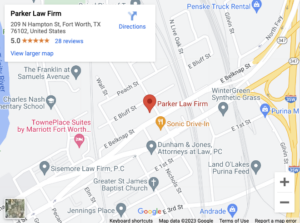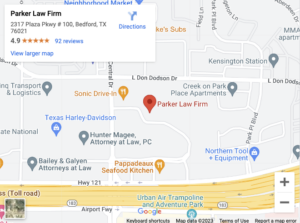
The judicial system cannot undo the harm and suffering you incurred. However, it can hold the party who caused your injuries financially responsible.Damages in a personal injury case compensate you for the physical, emotional, and financial harm caused by another party.
What Are Compensatory Damages in a Texas Personal Injury Case?

Compensatory damages compensate you for expenses and financial losses (economic damages) and pain and suffering (non-economic damages). Examples of the damages you may receive for a personal injury claim include medical expenses, lost wages, emotional suffering, and more.
Medical Treatment
Your medical bills include, but are not limited to:
- Doctor’s visits
- Hospitalizations
- Emergency care
- Surgeries
- Diagnostic tests
- Occupational, physical, and other types of rehabilitative therapies
- Nursing care
- Medications and medical supplies
The insurance company may argue that the medical expenses are unnecessary or unreasonable. Your doctor may need to provide additional information and opinions to justify your treatment. Another common tactic insurance companies use is paying a discounted rate for medical bills, which can lower damages.
You may also receive compensation for future medical care and treatment if you sustain a life-long injury. The damages may also include long-term personal care and nursing care.
Loss of Income
If you are unable to work because of your injuries, you can recover compensation for your loss of income.
Loss of income includes all income you would have earned, including but not limited to:
- Wages
- Salaries
- Overtime pay
- Bonuses
- Commissions
- Tips
- Part-time income
- Freelance and gig work
- Independent contractor income
Your loss of earnings may also include the benefits you would have earned had you been working, such as retirement benefits or paid time off. You may also receive compensation for sick time, and vacation pay you used while you were out of work.
Sometimes, an injury may prevent you from returning to work at all. If so, you can receive compensation for future lost wages. When injuries prevent you from earning as much as you did before the accident, you may be entitled to a monetary award for diminished earning capacity.
Future damages are difficult to calculate. Experienced Texas personal injury lawyers work with medical specialists, vocational experts, financial professionals, and other experts to estimate future damage accurately.
Out-of-Pocket Expenses
This category is a catchall for other expenses and bills you incur that do not fall under lost wages or medical bills.
It can include, but is not limited to:
- Travel expenses to and from doctor’s appointments
- Medical supplies and over-the-counter medications you purchase
- Household services and help with childcare
- Assistance with personal care
- Modifications to your home or vehicle because of a disability
Out-of-pocket expenses are often overlooked by individuals. However, these expenses can add up very quickly. Keep detailed records of all expenses you incur because of a personal injury or accident, including receipts, bills, invoices, and other proof of the expense.
Property Damage
You can receive compensation for the damage to property caused by another party.Property damage claims are often associated with motor vehicle accident claims but can arise in any personal injury case.
The insurance company may settle the property damage claim while you still receive treatment for your injuries. Be cautious when signing documents for the insurance company. Read the fine print to ensure you are not waiving your rights to personal injury claims.
Pain and Suffering Damages
Pain and suffering damages encompass numerous types of harm caused by injuries and accidents.
This category includes, but is not limited to:
- Emotional distress and mental anguish, including anxiety, depression, PTSD, and other psychological conditions
- Pain from physical injuries, including pain caused by medical treatments
- Scarring and disfigurement, including embarrassment about the condition
- Impairments and disabilities, including inconvenience caused by the disabling condition
- Diminished quality of life and loss of enjoyment of life caused by long-term injuries and disabilities
Non-economic damages can be challenging to value because there is no standard formula for putting a price tag on pain and suffering. Keeping a pain and suffering journal can help. Write down the details of your recovery, including activities you cannot perform, daily pain levels, and the adverse impact your injuries have on your life and relationships.
Punitive Damages in a Texas Personal Injury Case
Punitive damages are a special type of compensation available in some personal injury lawsuits. The Texas Civil Practice and Remedies Code refers to these damages as exemplary damages.
Exemplary damages are awarded by juries in personal injury lawsuits to punish at-fault parties for specific types of conduct, such as:
- Gross negligence – Conduct that has an extreme degree of risk, considering the potential harm to other people.
- Malice – Someone acts with malice if they intentionally try to cause someone harm or injury. Assault would be an example of malice.
- Fraud – Conduct other than constructive fraud committed with the willful intent to deceive.
Theburden of proof for punitive damages is higher than the burden of proof for compensatory damages. Also, Texas caps the amount of punitive damages a person can receive in a personal injury lawsuit.
What Is the Deadline to File a Claim for Damages for Personal Injury Claims in Texas?
The Texas statute of limitations is two years for mostnegligence-based personal injury cases. The court can dismiss lawsuits filed after the two-year deadline. If so, you cannot pursue your claim through the court.
It is important to note that the facts of your case or exceptions to the statute of limitations can change the deadline to file a personal injury lawsuit. The best way to protect your right to file a legal claim is to seek legal advice as soon as possible after an accident or injury. An attorney will review your case, explain your legal options, and discuss the deadlines for filing a claim.
Get Help Recovering Damages for an Injury Claim in Texas
Our Texas personal injury lawyers help you fight for a fair personal injury settlement. We work to recover a settlement or verdict compensating you for all damages. Call Parker Law Firm Injury Lawyers for a free consultation with a member of our legal team.
Other Resources
- Evaluating Your Claim
- Personal Injury Case Process
- The Parker Law Firm Injury Lawyers Introduction
- What are Pain and Suffering Damages?
- What Happens In A Personal Injury Case In Texas?
- Why Should I Contact A Personal Injury Attorney Early On?
- Why Hire Parker Law Firm Injury Lawyers In Texas
- Why Should I Contact A Personal Injury Attorney Early On?
- Why is Parker Law Firm Injury Lawyers in Bedford Unique?


